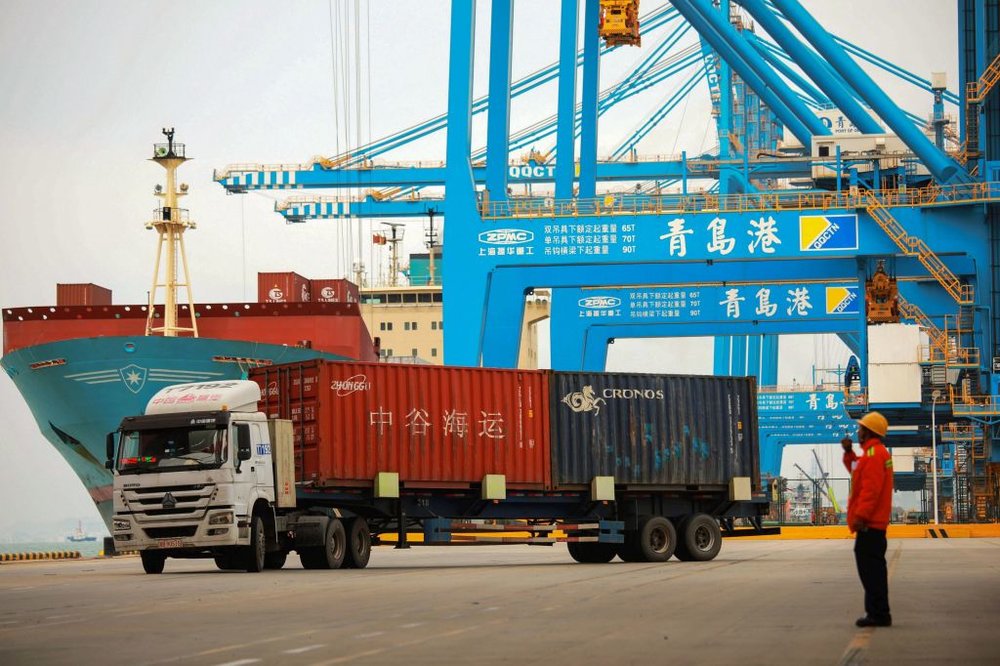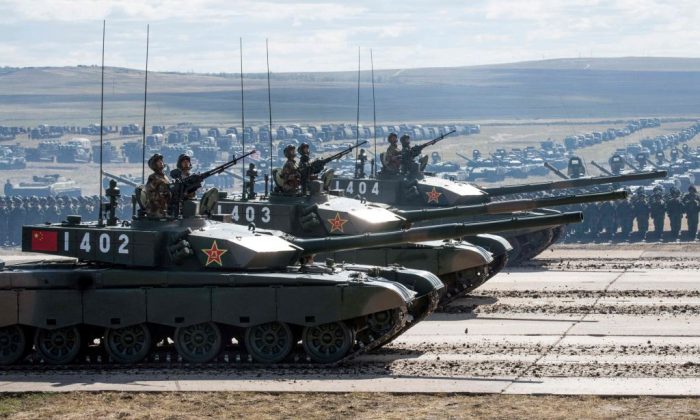November 15, 2018 Updated: November 15, 2018
WASHINGTON-The Chinese Communist Party (CCP)’s coordinated and long-term efforts to become a dominant global power have put at risk the national security and economic interests of the United States, its allies, and its partners, and U. S. policy makers have difficult decisions to make based on the new reality, according to the annual report to the Congress by the U.S.-China Economic and Security Review Commission (USCC).
Released on Nov. 14, the 525-page report addresses issues in 4 sectors: U.S.-China economic and trade relations, U.S.-China security relations, China and the world, and China’s high-tech development.
Michael Wessel, who has been a commissioner ever since USCC was created in October 2000, said the 2018 report is “evolutionary.”

L-R: Commissioner Micheal McDevitt, Commissioner Katherine Tobin, Vice Chairman Carolyn Bartholomew, Chairman Robin Cleveland, Commissioner Glenn Hubbard, Commissioner Roy Kamphausen, and Commissioner Larry Wortzel attending the roll out of the U.S.-China Economic and Security Review Commission report in the Hart Office Building in Washington on Nov. 14, 2018. (Jennifer Zeng/The Epoch Times)
“Many of the concerns that we have raised continue to evolve,” he said. “We now see that the public policy system is caught up in part to the assessments we’ve been making for a number of years.
“This year is really about doubling down in terms of the assessment and looking at other tools that can be used to address the challenges we face.”
In the introduction to the report, its authors said: “For several decades, U.S. policy toward China was rooted in hopes that economic, diplomatic, and security engagement would lay the foundation for a more open, liberal, and responsible China. Those hopes have, so far, proven futile.”
“Many of those who supported China’s accession to the World Trade Organization believed economic growth would raise the quality of life for the Chinese people, but hoped it would also deepen reform and perhaps eventually spark political liberalization. The opposite has happened, ” the introduction says.
“The CCP has used economic growth—coupled more recently with its anticorruption campaign—to strengthen its own grasp on authority, advance its state-capitalist model, buttress authoritarian governments abroad, leverage its market against other nations, and fund a massive buildup of Chinese military power to intimidate and silence its neighbors.”
The report also finds that China’s economic liberalization has stalled and many reforms have been reversed. It also describes the damage done U.S. companies and the U.S. economy.

This handout image provided by Chinese tech company Huawei shows a giant artificial intelligence-powered Rubiks Cube in London, England on Oct. 25, 2018. (Tom Nicholson/Huawei via Getty Images)
“Foreign companies hoping to participate in China’s market must pay a high price for admission, transfer technology, and suffer regulations that tilt the playing field in favor of their Chinese competitors. U.S. companies, inventors, and workers have witnessed the damaging impact of China’s trade-distorting policies in curtailed exports, stolen intellectual property, and dumped products flooding the U.S. market. ”
Security Relations
With U.S.-China security relations, the report notices that China has increased its efforts to build a “world-class” military and to advance its sovereignty claims over disputed territory.
“By 2018, leaders of the U.S. Indo-Pacific Command, U.S. Navy, and U.S. Air Force have all publicly referred to China’s military as a ‘peer Competitor’ in certain scenarios,” the report says.
“In word and deed, the CCP has abandoned any inclination for economic and political liberalization. Rather than promoting fair trade and investment, China engages in predatory economic practices.
“Rather than providing development finance in line with established rules, China provides loans and investment in nontransparent ways on projects that do not always meet global governance standards and pass tests of commercial viability,” the report concludes.
“Rather than respecting other countries’ sovereign rights, China is altering the status quo in the Indo- Pacific and has publicly congratulated itself on its militarization of the South China Sea.
“Rather than promoting the free flow of information and human rights at home and abroad, China is doubling down on censorship and technologically-enabled repression, including against China’s Uyghur ethnic minority population.”
When discussing the “Belt and Road Initiative (BRI)”, which is referred to by the CCP as the “project of the century” and was even written into China’s constitution, the report finds, “BRI could pose a significant challenge for U.S. interests and values because it may enable China to export its model of authoritarian governance and encourages and validates authoritarian actors abroad.”
Influence Efforts
When discussing China’s relations with U.S. allies and partners, the report mentions that “Beijing has intensified its influence efforts using an expanding array of tools, often to the detriment of the United States and its relationships with important allied and partner countries…Beijing’s use of these influence instruments aims to weaken opposition to China’s policies and undermine and subvert U.S. alliances and partnerships. If successful, these efforts could fundamentally weaken the United States’ ability to support democracy and international law.”
The report uses one full chapter to discuss China’s high-tech development in next generation connectivity, and finds that “the Chinese government seeks to overtake the United States in these industries to gain a higher share of the economic benefits and technological innovation.

A staff member watches over a truck as he talks on his interphone at a port in Qingdao, in east China’s Shandong Province on Nov. 8, 2018. (STR/AFP/Getty Images)
“Chinese firms have already leveraged strong state support to become global leaders in information technology and network equipment manufacturing, and have strengthened their roles in international standards-setting and deployment of 5G, ” the report says.
The report warns against not only about the possibility of loss of economical and market opportunities, but also the security risks the U.S. would suffer if it cannot catch up in these areas.
“The lax security protections and universal connectivity of Internet of Things (IoT) devices create numerous points of vulnerability that hackers or malicious state actors can exploit to hold U.S. critical infrastructure, businesses, and individuals at risk. These types of risks will grow as IoT devices become more complex, more numerous, and embedded within existing physical structures.”
Recommendations
To tackle all the challenges, the report lays out 26 recommendations, identifying the following as key:
-
Preparing an annual report to Congress to ensure supply chain vulnerabilities from China are adequately addressed;
-
Examining whether the Office of the U.S. Trade Representative should bring, in coordination with U.S. allies and partners, a “non-violation nullification or impairment” case—alongside violations of specific commitments—against China at the World Trade Organization;
-
Examining the application of current U.S. laws to prosecuting Chinese Communist Party affiliates who threaten, coerce, or otherwise intimidate U.S. residents, clarifying that labels required by the Foreign Agents Registration Act on informational materials disseminated on behalf of foreign principals, such as China Daily, must appear prominently at the top of the first page of such materials;
-
Producing a National Intelligence Estimate (NIE), with a classified annex, that details the impact of existing and potential Chinese access and basing facilities along the Belt and Road on freedom of navigation and sea control, both in peacetime and during a conflict;
-
Producing an unclassified annual report, with a classified annex, on the Chinese Communist Party’s influence and propaganda activities in the United States;
-
Providing a report, with a classified annex, assessing how the change in the China Coast Guard’s command structure affects its status as a law enforcement entity now that it reports to the Central Military Commission.
-
Identifying (1) steps to ensure the rapid and secure deployment of a 5G network, with a particular focus on the threat posed by equipment and services designed or manufactured in China; and (2) whether any new statutory authorities are required to ensure the security of domestic 5G networks.
-
Conducting an assessment of U.S.-China collaborative initiatives in technical cooperation.
-
Providing a report within 180 days on the current state of Chinese enforcement of sanctions on North Korea.
-
Identifying the trade-distorting practices of Chinese state-owned enterprises and develop policies to counteract their anticompetitive impact.
Source: https://www.theepochtimes.com/report-hopes-that-guided-us-china-policy-proven-futile_2716979.html

Chinese tanks parade not far from the borders of China and Mongolia in Siberia, on Sept. 13, 2018. (MLADEN ANTONOV/AFP/Getty Images)
